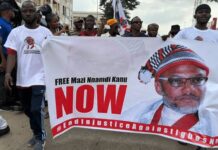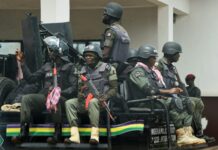Justice Tijjani Ringim of the Federal High Court, Lagos yesterday ordered the interim forfeiture of the funds and properties traced to Mr. Abidemi Ganiyu Rufai who is standing trial in the US for cyber crime-related offences.
Rufai is the suspended aide of the governor of Ogun State, Mr. Dapo Abiodun
The order covers Rufai’s property located at House 11. Omodayo Awotuga Street, Bera Estate, Chevy View, Lekki, Lagos and funds in his accounts with two new generation banks.
The judge made the order sequel to an ex parte motion filed and argued by counsel for the Economic and Financial Crimes (EFCC), Mr. Ebuka Okongwu.
The EFCC joined Rufai and his firm Omo Mayodele Global Investment as 1st and 3rd respondents in the suit.
Okongwu told the judge that it was essential for the court to grant the prayer of interim forfeiture to preserve the res and prevent further dissipation of the defendants’ funds.
He furnished the judge with an affidavit sworn to by an EFCC investigator, Mr. Usman Abdulhamid, detailing the agency’s investigation of Rufai in collaboration with the Federal Bureau of Investigation (FBI).
According to the affidavit, the EFCC found that on March 19, 2020, there was an inflow of N4,500,000, which was further dissipated the same day in five tranches of N1,000,000 (in four places) and N500,000 into Rufai’s Guaranty Trust Bank (GTBank) Account.
It said the transaction recurred in the 1st Respondent’s account domiciled with the 3rd respondent.
Subsequent transactions included but not limited to “transactions of the sum of N5,000,000 on the 27th March 2020, N5,000,000 on 3rd April 2020; N2,730,000 on the 7th April 2020; N1,100,000; N2,040,000 on the 14th April 2020; N2,000,000 on the 27th April 2020; N2,000,000 on the 28th April 2020; N5,000,000 on the 13th May 2020, and numerous other transactions, which were all dissipated to his GTB account on the same day of the inflow.
“Further analysis revealed that prior to the first inflow on the 19th March 2020, the 1st respondent’s account rarely receives such traffic and huge inflows.
“Upon proactive investigative method of asset tracking and recovery conducted by the Commission, it was revealed that the 1st respondent owns a property located at House 11. Omodayo Awotuga Street, Bera Estate, Chevy View, Lekki, Lagos, Nigeria.”
The EFCC added that it wrote various letters of investigation activities to various financial institutions, agencies and related regulatory bodies, some of the responses of which are still being awaited.
In his ruling, the judge said: “I am satisfied by the averment in the affidavit deposed to by Usman Abdulhamid and the legal submission of the counsel that this application should succeed and same is accordingly granted as prayed,” the judge said.
He ordered the EFCC to publish the order within 14 days from yesterday (Tuesday) for any interested party to show any cause why the funds and properties should not be permanently forfeited to the federal government.
He adjourned further proceedings till December 1, 2021.
It would be recalled that Rufai was arrested in the Eastern District of New York while trying to leave the U.S. on May 24, 2021.
He is accused of using the identities of more than 100 Washington residents to steal more than $350,000 in unemployment benefits from the Washington State Employment Security Department (ESD) during the COVID-19 pandemic last year.
He is said to have bypassed security systems at the Washington ESD using a simple feature of Google’s free Gmail service.
On May 26, 2021, a grand jury approved an indictment charging the defendant who has remained in custody since his arrest with 15 offences.
The charges filed at U.S. District Court for the Western Washington at Tacoma, comprise conspiracy to commit wire fraud, nine counts of wire fraud, and five counts of aggravated identity theft.
He was arraigned before the court on June 25, 2021 when he denied the charges by pleading not guilty to all counts.
The court then scheduled trial for August 31, 2021, and set a pretrial motions deadline of July 23, 2021.
Both the prosecution and the defence asked for a postponement of the trial date.
The agreed application was based principally on the concerns expressed by Rufai’s lawyers about their need for more time to prepare for the defence.

























































